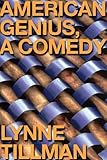 Starting Lynne Tillman’s American Genius, A Comedy, I was led to assume by the confessional intimacy of the voice that this would be a story on a scale small enough to match the closeness its first-person narrator’s tone made me feel to her. But then I began to notice how many physical locations she was taking me to on a given page, or even in a typical supple and quicksilver sentence, and how many temporal locations, and how many of the novel’s vast range of themes and motifs she was advancing, and how many different — often contradictory — attitudes toward a given assertion she was adopting or testing out. Another way to describe this narrator’s propensity to make an assertion and then to iterate a number of alternative and mutually opposing points of view about it would be to say that the novel she inhabits, even at the level of a single sentence, is polyphonic, that its central voice contains many voices.
Starting Lynne Tillman’s American Genius, A Comedy, I was led to assume by the confessional intimacy of the voice that this would be a story on a scale small enough to match the closeness its first-person narrator’s tone made me feel to her. But then I began to notice how many physical locations she was taking me to on a given page, or even in a typical supple and quicksilver sentence, and how many temporal locations, and how many of the novel’s vast range of themes and motifs she was advancing, and how many different — often contradictory — attitudes toward a given assertion she was adopting or testing out. Another way to describe this narrator’s propensity to make an assertion and then to iterate a number of alternative and mutually opposing points of view about it would be to say that the novel she inhabits, even at the level of a single sentence, is polyphonic, that its central voice contains many voices.
So, while tracking her protagonist’s mental and physical peregrinations in time and space to and from the mysterious retreat-like communal living space that is the novel’s core location, Tillman composes and arranges in syntactical harmony a great many people and places and things: mothers and fathers, dogs and cats, the Empire State Building, Eames chairs, textile mills, China and Poland, 1733 and 2006, John D. Rockefeller and Jean Genet, coumadin, lanoxin, chocolate pudding, farting, murder, the Revolution and World War II, shoes, bikes, cars, a lost brother, a City upon a Hill, worry that does not hinder exuberance or vice versa. In American Genius, a Comedy, Tillman becomes, in effect, a dozen Ellingtons conducting a monumental symphony played by an orchestra consisting of a single multifarious instrument.
Read an excerpt from American Genius, A Comedy.
The Millions review of American Genius, A Comedy.
More Best Fiction of the Millennium (So Far)
Best of the Millennium, Pros Versus Readers








